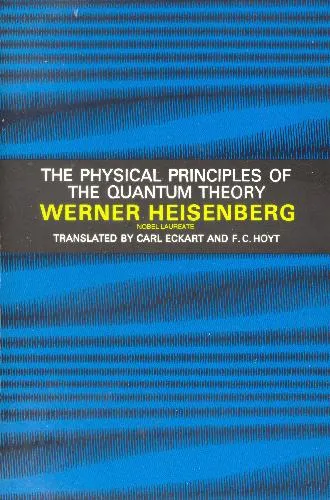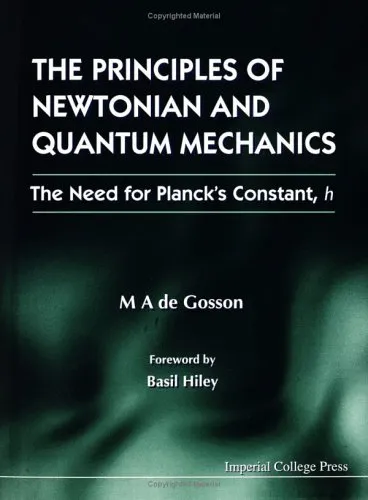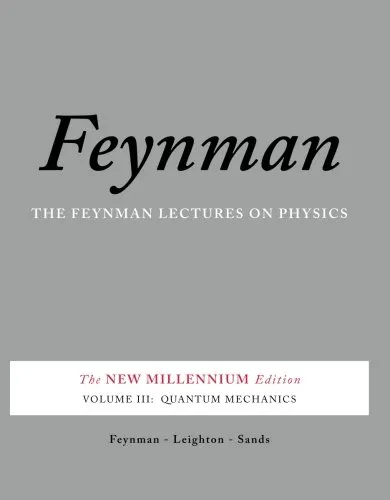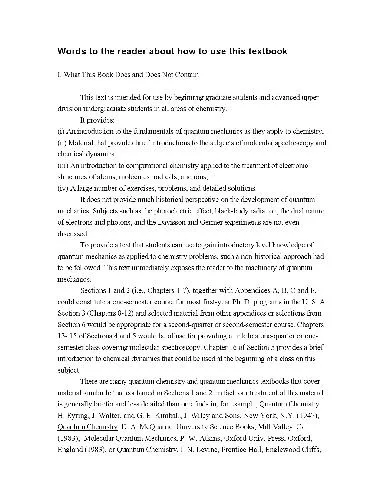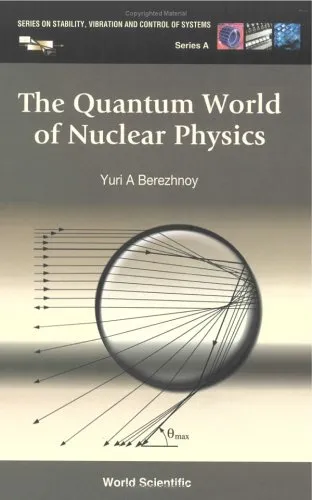The Physical Principles of the Quantum Theory
4.6
بر اساس نظر کاربران

شما میتونید سوالاتتون در باره کتاب رو از هوش مصنوعیش بعد از ورود بپرسید
هر دانلود یا پرسش از هوش مصنوعی 2 امتیاز لازم دارد، برای بدست آوردن امتیاز رایگان، به صفحه ی راهنمای امتیازات سر بزنید و یک سری کار ارزشمند انجام بدینکتاب های مرتبط:
معرفی کتاب "The Physical Principles of the Quantum Theory"
کتاب "The Physical Principles of the Quantum Theory" نوشته ورنر هایزنبرگ یکی از برجستهترین آثار علمی قرن بیستم محسوب میشود. این اثر کلیدی به مطالعه و تشریح اصول بنیادی مکانیک کوانتومی میپردازد و نقشی بیبدیل در شکلگیری درک ما از رفتار سیستمهای کوانتومی داشته است. خواندن این کتاب برای علاقمندان به حوزه فیزیک نظری و علوم طبیعی گامی اساسی است.
خلاصهای جامع از کتاب
کتاب "The Physical Principles of the Quantum Theory" از چند بُعد مختلف به بررسی مکانیک کوانتومی میپردازد. این کتاب ابتدا اصول پایه فیزیک کلاسیک را معرفی میکند تا خواننده به مقایسه بین رفتار کلاسیک و کوانتومی دست یابد. در ادامه، به مفاهیمی چون uncertainty principle، روابط موج-ذره، و تفسیر احتمالاتی از پدیدههای کوانتومی پرداخته میشود.
هایزنبرگ در این اثر، تأکید ویژهای بر تاریخچه شکلگیری مکانیک کوانتومی دارد و سپس به صورت تدریجی پیچیدگیهای ریاضی و مفهومی این حوزه را تشریح میکند. او موفق میشود با زبانی دقیق ولی روان، خوانندگان را با مفاهیم پیشرفتهای چون ماتریسها و eigenvalues، که پایه مکانیک ماتریسی هستند، آشنا کند. این جنبه مهمی از روش کار مکانیک کوانتومی است که پایه تحلیلهای بیشتر در فیزیک نظری محسوب میشود.
این کتاب به دلیل سطح علمی و ساختار بینظیر خود، همچنان به عنوان یکی از مراجع مهم در زمینه مکانیک کوانتومی شناخته میشود و برای محققین، دانشجویان و اساتید این حوزه ضروری است.
نکات کلیدی کتاب
- معرفی uncertainty principle و تأثیر آن بر علم فیزیک.
- تاکید بر تمایز بین مکانیک کوانتومی و مکانیک کلاسیک.
- تشریح مفهوم quantization و فیزیک موجی.
- ارائه نمونههای ریاضی از کاربردهای ماتریسی.
- تحلیلی منحصر به فرد از چگونگی پیشبینی رفتار ذرات زیراتمی.
جملات معروف از کتاب
"What we observe is not nature itself, but nature exposed to our method of questioning."
"Quantum theory provides us with a strikingly accurate description of physical systems, despite its fundamentally probabilistic nature."
چرا این کتاب اهمیت دارد؟
کتاب "The Physical Principles of the Quantum Theory" به عنوان یکی از نخستین تلاشها برای تبیین سازوکارهای پیچیده مکانیک کوانتومی و معرفی مفاهیمی نظیر uncertainty principle شناخته میشود. این کتاب نه تنها در پیشرفت فیزیک تئوری نقشی کلیدی ایفا کرده، بلکه تحولاتی عمیق در فلسفه علم ایجاد کرده است.
اثر هایزنبرگ بنیانی قوی برای پژوهشهای بعدی در حوزههای مختلفی مانند فیزیک ذرات، اپتیک کوانتومی، و کیهانشناسی ایجاد کرده است. از اینرو، مطالعه این کتاب به دانشجویان و پژوهشگران کمک میکند تا به فهم عمیقتری از اصول و چالشهای مکانیک کوانتومی برسند و دیدگاه انتقادی و تحلیلی خود را تقویت کنند.
Introduction to 'The Physical Principles of the Quantum Theory'
Authored by Werner Heisenberg, one of the key architects of quantum mechanics, 'The Physical Principles of the Quantum Theory' serves as a landmark work that distills the essence of quantum theory, presenting its theoretical underpinnings with clarity and depth. Published in the early 20th century, this book remains a cornerstone for anyone delving into the profound and often counterintuitive world of quantum mechanics.
The journey into quantum mechanics can be daunting, but Heisenberg’s book offers a comprehensive and systematic exploration of the fundamental principles governing the quantum world. This work not only addresses physicists and mathematicians but also appeals to scientifically curious readers eager to engage with the philosophical implications of quantum theory. Let us dive deeper into the structure and significance of this work.
Detailed Summary of the Book
In 'The Physical Principles of the Quantum Theory', Werner Heisenberg provides a foundation for understanding the behaviors of particles at an atomic and subatomic scale. The book begins with a discussion of the inadequacy of classical physics in explaining phenomena such as black-body radiation and the photoelectric effect, laying the groundwork for the necessity of a quantum framework.
Heisenberg introduces the reader to key quantum phenomena, such as wave-particle duality and the probabilistic nature of quantum states, before delving into the formulation of matrix mechanics — a revolutionary mathematical framework he pioneered. The book elaborates on how quantum mechanics departs from determinism, emphasizing concepts like indeterminacy, uncertainty, and measurement, culminating in the famous Heisenberg Uncertainty Principle.
Beyond the mathematics, Heisenberg masterfully intertwines theoretical concepts with experimental evidence, providing examples that highlight the interplay of theory and observation. Topics like quantum transitions, energy quantization, and atomic spectra are discussed with precision while being accessible to readers with a physics background. The book concludes by reflecting on how these principles have reshaped not only physical theory but also our fundamental understanding of reality.
Key Takeaways
- Quantum mechanics challenges classical intuitions, introducing concepts like superposition, uncertainty, and wave-particle duality.
- The Heisenberg Uncertainty Principle states that certain pairs of physical properties, such as position and momentum, cannot both be precisely measured simultaneously.
- Matrix mechanics, as formulated in this book, is one of the earliest and most robust mathematical approaches to quantum theory.
- The book presents a harmonious relationship between theoretical physics and experimental findings, validating the predictions of quantum mechanics.
- Heisenberg emphasizes the need to rethink concepts such as causality and determinism in light of quantum mechanics.
Famous Quotes from the Book
"What we observe is not nature itself, but nature exposed to our method of questioning."
"In the strict formulation of the law of causality—'If we know the present, we can calculate the future'—it is not the conclusion that is wrong but the premise."
"The idea of an objective real world whose smallest parts exist objectively in the same sense as stones or trees exist, independently of whether or not we observe them... is impossible."
Why This Book Matters
Heisenberg’s 'The Physical Principles of the Quantum Theory' holds monumental significance in the history of science. At a time when the boundaries of classical physics were being tested, this work offered a coherent and mathematical formulation of quantum mechanics that forever changed our understanding of the universe.
The book offers more than a technical exposition; it prompts readers to reflect on the philosophical implications of quantum theory, such as the nature of reality and limits of human knowledge. By explaining how quantum mechanics informs fields as diverse as chemistry, electronics, and cosmology, Heisenberg demonstrates the central role of quantum theory in modern science and technology.
Even decades after its publication, this book remains essential reading for students, researchers, and enthusiasts seeking an in-depth understanding of quantum mechanics. Its insights resonate not only in scientific endeavors but also in philosophical discussions about determinism, observation, and reality itself.
'The Physical Principles of the Quantum Theory' is more than a scientific work; it is a manifesto of intellectual curiosity and a profound testament to the human drive to comprehend the universe. Heisenberg’s lucid prose and rigorous approach make this book a timeless classic in the canon of scientific literature.
دانلود رایگان مستقیم
شما میتونید سوالاتتون در باره کتاب رو از هوش مصنوعیش بعد از ورود بپرسید
دسترسی به کتابها از طریق پلتفرمهای قانونی و کتابخانههای عمومی نه تنها از حقوق نویسندگان و ناشران حمایت میکند، بلکه به پایداری فرهنگ کتابخوانی نیز کمک میرساند. پیش از دانلود، لحظهای به بررسی این گزینهها فکر کنید.
این کتاب رو در پلتفرم های دیگه ببینید
WorldCat به شما کمک میکنه تا کتاب ها رو در کتابخانه های سراسر دنیا پیدا کنید
امتیازها، نظرات تخصصی و صحبت ها درباره کتاب را در Goodreads ببینید
کتابهای کمیاب یا دست دوم را در AbeBooks پیدا کنید و بخرید
1262
بازدید4.6
امتیاز0
نظر98%
رضایتنظرات:
4.6
بر اساس 0 نظر کاربران
Questions & Answers
Ask questions about this book or help others by answering
No questions yet. Be the first to ask!
